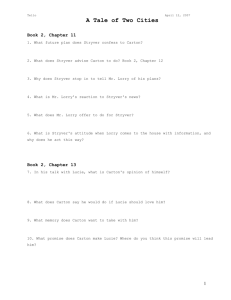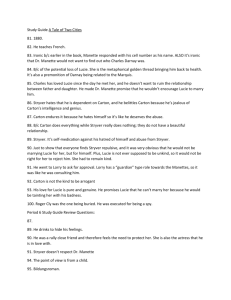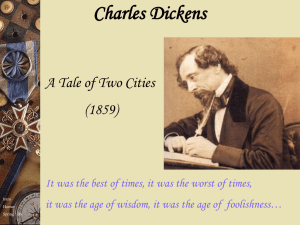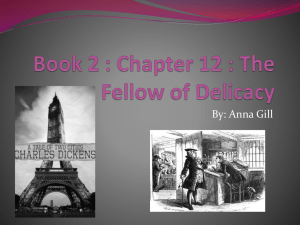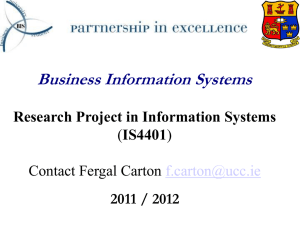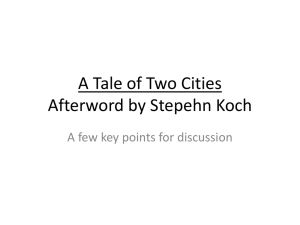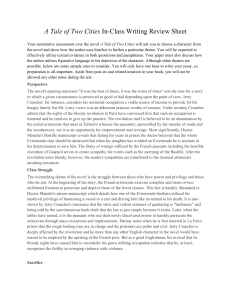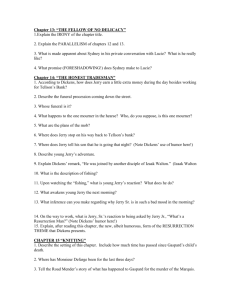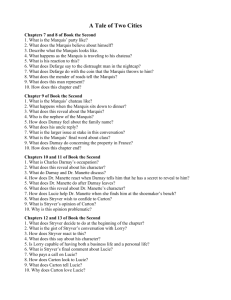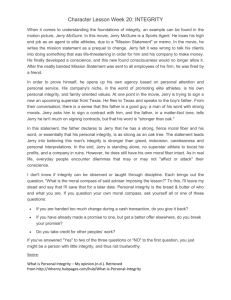Completed Worksheet
advertisement
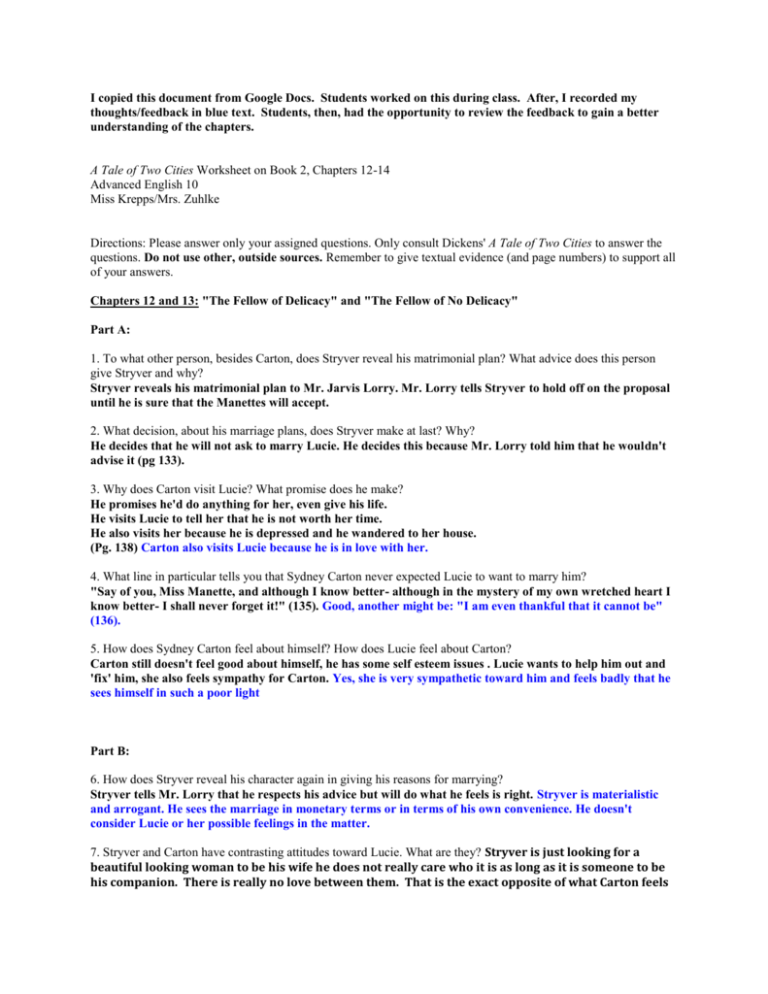
I copied this document from Google Docs. Students worked on this during class. After, I recorded my thoughts/feedback in blue text. Students, then, had the opportunity to review the feedback to gain a better understanding of the chapters. A Tale of Two Cities Worksheet on Book 2, Chapters 12-14 Advanced English 10 Miss Krepps/Mrs. Zuhlke Directions: Please answer only your assigned questions. Only consult Dickens' A Tale of Two Cities to answer the questions. Do not use other, outside sources. Remember to give textual evidence (and page numbers) to support all of your answers. Chapters 12 and 13: "The Fellow of Delicacy" and "The Fellow of No Delicacy" Part A: 1. To what other person, besides Carton, does Stryver reveal his matrimonial plan? What advice does this person give Stryver and why? Stryver reveals his matrimonial plan to Mr. Jarvis Lorry. Mr. Lorry tells Stryver to hold off on the proposal until he is sure that the Manettes will accept. 2. What decision, about his marriage plans, does Stryver make at last? Why? He decides that he will not ask to marry Lucie. He decides this because Mr. Lorry told him that he wouldn't advise it (pg 133). 3. Why does Carton visit Lucie? What promise does he make? He promises he'd do anything for her, even give his life. He visits Lucie to tell her that he is not worth her time. He also visits her because he is depressed and he wandered to her house. (Pg. 138) Carton also visits Lucie because he is in love with her. 4. What line in particular tells you that Sydney Carton never expected Lucie to want to marry him? "Say of you, Miss Manette, and although I know better- although in the mystery of my own wretched heart I know better- I shall never forget it!" (135). Good, another might be: "I am even thankful that it cannot be" (136). 5. How does Sydney Carton feel about himself? How does Lucie feel about Carton? Carton still doesn't feel good about himself, he has some self esteem issues . Lucie wants to help him out and 'fix' him, she also feels sympathy for Carton. Yes, she is very sympathetic toward him and feels badly that he sees himself in such a poor light Part B: 6. How does Stryver reveal his character again in giving his reasons for marrying? Stryver tells Mr. Lorry that he respects his advice but will do what he feels is right. Stryver is materialistic and arrogant. He sees the marriage in monetary terms or in terms of his own convenience. He doesn't consider Lucie or her possible feelings in the matter. 7. Stryver and Carton have contrasting attitudes toward Lucie. What are they? Stryver is just looking for a beautiful looking woman to be his wife he does not really care who it is as long as it is someone to be his companion. There is really no love between them. That is the exact opposite of what Carton feels for Lucie. Carton says to Lucie that she is the whole reason that he is still alive and his heart can still feel something. He loves Lucie with all his heart and would die for her. She is his whole life and she doesn't even know it until he tells her in chapter 13. What Carton feels for Lucie is undying, passionate, determined love. What Stryver feels for Lucie is nothing, just someone that will wake up and make him breakfast everyday. Good, simply put, Stryver is self-seeking, self-centered, unconcerned about Lucie while Carton is unselfish, concerned principally with Lucie's welfare and happiness. 8. How does Stryver's attitude toward his defeat in love further reveal his character? He was embarrassed and told Lorry to pretty much forget everything he just said. It says that he's always worried about his rep, and he doesn't want to look like a loser. "...say no more about it; thank you again for allowing me to sound you; good-night!" (pg 133-134) It also shows that he wasn't really concerned with Lucie as a human being but only as a possible adornment to himself. He quickly and easily gives up the pursuit once he finds a way of salvaging his pride. 9. How does Mr. Lorry show himself as a perceptive old man in his advice to Stryver? He advises Stryver not to propose until he knows that he will succeed or in other words, her family will accept him. "I wouldn't go on such an object without having some cause to believe that I should succeed," (130) Yes, he realizes that Stryver would be a terrible match for Lucie. 10. Why does Lucie weep during the interview with Carton? Lucie started crying because, Carton started crying and she knows it's partially her fault because she doesn't love him. Also, she sees in Carton the fine man who might have been. Part C: 11. Stryver presents first to Carton and then to Lorry his intentions to marry Lucie. There is much irony, quite unintended by Stryver, in his own words and thoughts concerning himself. Why? Give some examples. (Please refer back to previous chapters. See pages 125-127, 130, 133.) This is ironic because Carton wants to marry Lucie, and Carton has been to the Manette's house more times than Stryver has. Carton says, "If it had been possible, Miss Manete, that you could have returned the love of the man you see before you..." (Dickens 135) Stryver's own image of himself and his relationship to others is completely different with reality. Unconsciously, his own words and thoughts emphasize what a pompous, insensitive man he is. Examples include p. 125, lines 12-16 & 37-38; p. 126, lines 29-34; p. 127, lines 27-28; p. 130, lines 28-30; p. 133, lines 14-17. 12. On p. 128, in what way does Stryver look upon his marriage plans? What basic element has Stryver not taken into account? Stryver looks at his marriage as just an arrangement of two people but he forgets to consider how Lucie feels about him. He thinks she will marry him because he is a successful business man. Yes, specifically, he sees the marriage in legal terms, and yes, he overlooks the human element. 13. We display different personalities when we are with different people. When Carton is talking to Stryver, he is bitter, mocking, and cynical. How does he speak when he is talking with Lucie? How does Dickens want his readers to feel about Sydney Carton? Dickens wants his readers to think that Sydney Carton's personality is always changing and that he is in a way two-faced. Carton speaks to Lucie as if he is suicidal because he is always saying that she is the reason for living. So do we sympathize with him like Lucie, or not? He's really sensitive and almost suicidal. "...I would embrace any sacrifice for you and those dear to you." (pg 138, line 7-8) Yes, he is very open and sensitive, even idealistic. 14. In Chapter 13, there are several hints about the role Carton may play in the future in the life of Lucie. (See p. 135, lines 27-28; p. 138, lines 14-16) Can you think of ways in which Sydney Carton might help Lucie in the future? Carton might help Lucie as a friend. On page 138, Mr. Carton is saying that when Miss Manette gets married and has children that whenever she looks at her loving children she should think of Mr. Carton and how would give his life for her. The quote that supports this idea is "O Miss Manette, when the little picture of a happy beauty springing up anew at your feet, think now and then that there is a man who would give his life, to keep a life you love beside you!" (page 138, lines 14-16) 15. If Lucie had chosen to marry Sydney Carton, what would probably have been the reactions of Dr. Manette, Mr. Lorry, Charles Darnay, and Mr. Stryver? Dr. Manette: He'd be sad that he'd have to let his daughter go but he'd probably get over it eventually. He'd be happier with him marrying Lucie than Mr. Stryver. Mr. Lorry: Mr. Lorry would have mixed feelings about it. He's a man of business so he might not be too upset. Mr. Stryver: He would get very angry and wouldn't ever talk to Lucie again. Charles Darnay: He would be more upset than anything, because he said he would let Lucie love whoever she wants. He just wants Lucie to be happy. What other reactions might each of them have? Why would they have those reactions? Chapter 14: The Honest Tradesman Part A: 16. Whose funeral passes Tellson's Bank? Why is it poorly attended? It is Roger Cly's funeral. It was poorly attended because he was a convicted spy and he testified against Charles Darnay. 17. Why does Jerry Cruncher leave his favorite spot outside Tellson's Bank? He notices a funeral and a very large crowd, and he gets up to join the funeral. (139-140) Yes, for purposes of his own, Jerry joins to find out where the body is to be buried. Then, he makes arrangements. 18. Why is Jerry interested in the funeral? Because he wants to see who died so he will be able to find his grave to dig it up and sell it to science for money (pg. 145-146) Jerry is a "body snatcher," one who supplies bodies to surgeons for dissection. 19. Why does Jerry call upon "his medical adviser," the surgeon? He called upon the medical adviser because Jerry was later going to dig up Roger Cly's body and sell the body to the medical adviser. Specifically, he probably is calling the surgeon to make arrangements for delivering the body and possibly setting a price. 20. Why does Jerry leave his house late at night? What is his purpose? Jerry went to go 'fishing' but instead he went to go dig up Mr. Cly body to sell it to a scientist to make money. 21. Where does he tell his wife and son he is going? Does Jerry's wife know where he is really going? Jerry told his wife and son that he was going fishing. Jerry's wife knew he was going to the cemetery to dig up a body. How do we know that his wife knows? 22. Describe what young Jerry witnessed. Jerry witnesses his father going through the town meeting with the other fishermen and then his father going with the other "fishermen" to dig up a grave. He sees the coffin being lifted out of the grave and thinks that it is "chasing him." (pg 144-145) 23. Jerry's is in a foul mood the following day. What might have happened the night before? Jerry got into a fight with his wife because she was praying towards him. He might have been in a foul mood the following day because the night before seeing the dead body and doing that business may have made him upset. Why else might he be in a bad mood? We know, from what young Jerry witnessed, that they pulled up the coffin, but does Jerry find the body and sell it to the surgeon? 24. What respectable-sounding job title does Jerry give his occupation? Jerry says that he is a honest tradesman, but he is actually a a resurrection-man. (pg. 147, lines 25-37) Resurrection man is actually the "respectable-sounding job title" compared to others such as "body snatcher" 25. This chapter seems to be an interlude in the main thread of the story. Yet, what one connecting link is there with an earlier important event in which Darnary, the Manettes, and Mr. Lorry were involved? They all were involved with the trail of Charles Darnay and the boat ride back from paris. And Roger Cly was one of the witnesses at the trial. Part B: 26. How does young Jerry again attempt to imitate his father? Young Jerry assists his father by carrying a stool for him to the cemetery. (He's actually carrying it to Tellson's) Young Jerry being side by side with his father is his way of imitating his father. He also talks roughly to Mrs. Cruncher as well as takes Jerry's place outside Tellson's Bank when his father isn't there. 27. Why does young Jerry follow his father on his expedition? He was "Impelled by a laudable ambition to study the art and mystery of his father's honest calling" (pg. 144) Yes, in simple terms, he is curious. Also, he wants to be like his father and follow in his footsteps. 28. Why is Jerry's wife so upset by Jerry's activities? He doesn't feel like his wife is being a good one because she doesn't respect what he does to get money. Also, she's upset because he has to lie to her about where he's going. (pg. 146) Yes, she realizes that Jerry is a body snatcher and disapproves. Also, she has great religious compunctions about his activity. 29. How does Jerry again show his tendency to bully? He beat up his wife because he found her praying again (146 lines 15-25). 30. Why does Cruncher look at young Jerry with pride at the end of the chapter? In what way is he even more justified than he knows? Cruncher is proud of his son because, his son sees him digging about the grave and he tells his dad that he wants to be a resurrection man when he grows up. It's more justified than he knows because he doesn't know his son saw him dig up the grave. Part C: 31. What does Dickens think of the behavior of the mob at the funeral? Give examples to support your answer. He portrays the crowd of people all dressed in regular clothes all scorning Roger Cly and calling him a spy. The crowd seems to be celebrating his death more than they are mourning it. Meanwhile there is only one mourner dressed in black. 32. Throughout the chapter, the joke about Jerry's "fishing" is maintained. What is Jerry actually "fishing" for? What is his "fishing equipment" consist of? Jerry is fishing for dead people (147). Sack, crowbar, rope and chain (144) 33. How does Dickens poke fun at Cruncher's "gallantry" in escorting women from one side of Fleet Street to the other? "Since a small part of his income was derived from the pilotage of timid women...from Tellson's side of the tides to the opposite shore." (page 138 line 30-33). He is like a boyscout, and gets paid for helping women cross the road. In other words, Cruncher's "gallantry" is for the purpose of tips. 34. Why does Dickens use the word "moral" in the sentence: "Mr. Cruncher was soothed, but shook his head in a dubious and moral way?" He was soothed because his son wants to be a resurrection-man but he shook his head in a moral way because he thinks that his son doesn't know that he is one. The word is used ironically. Jerry's business is scarcely a moral one. Yet Jerry assumes a very self-righteous pose in attacking his wife's disapproval. 35. What special purpose does Jerry Cruncher serve in this novel? Jerry Cruncher, could be a symbol for something. A symbol like the desparation of the time. He provides comic relief. Dickens was well-known for including comic characters in his novels.
